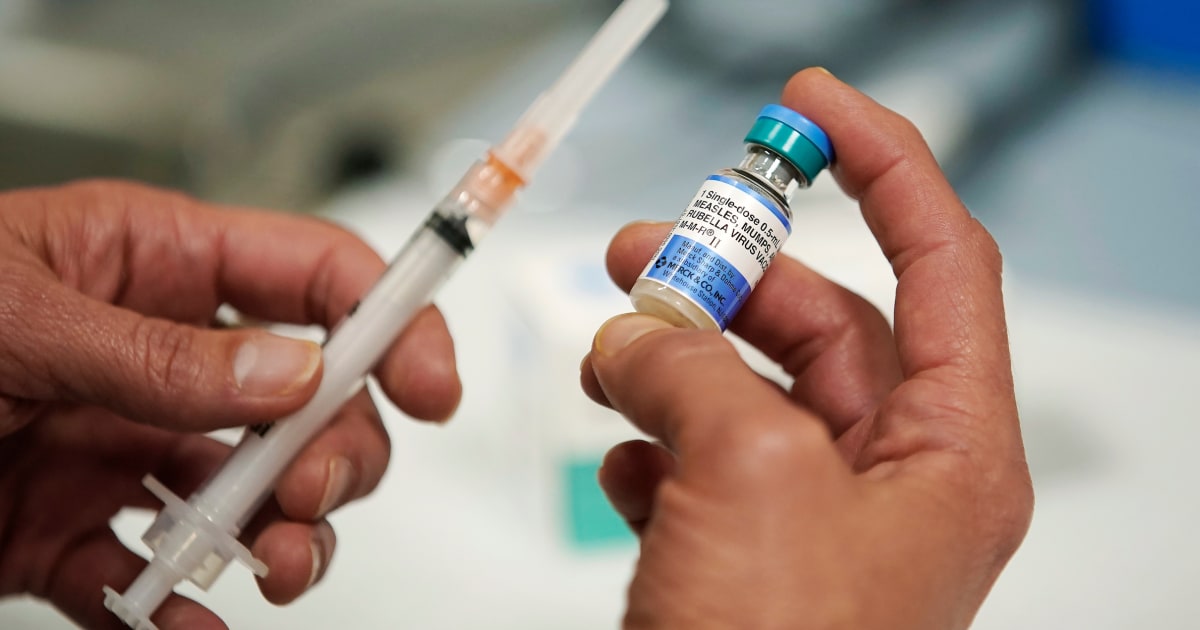Shaima arrived at the hospital the night before.
One by one, for 10 days, six of her eight children have been sick with measles.
First, they started with a cough.
Then severe fever.
And in the end, her skin began to break out in rashes.
All have been recovering, after about six or seven days, except two of his girls.
Seeing no improvement, Shaima, 30, has decided to bring them to the Indira Gandhi Children's Hospital in Kabul, which is Afghanistan's main medical center for the care of little ones.
Since then, she has been waiting in a crowded room with dozens of mothers with sick children.
In this country, the disease is endemic, it especially affects unvaccinated children under five years of age and can be fatal.
The World Health Organization (WHO) has warned that Afghanistan is experiencing a measles resurgence that began last year.
From January 2021 to March 13, 2022, there have been 48,366 cases and 250 deaths.
And this year, only until the month of March, the WHO has reported 18,000 infections and at least 142 deaths.
Being an ailment that especially affects the smallest, 97% of the dead were under five years old.
PHOTO GALLERY
Kabul children's hospital overflows with patients
To understand how the country got to this point, you have to go back a few months.
2021 was an especially hard year for the population.
Intense fighting between the Afghan army and the US-led international coalition against Taliban guerrillas forced
698,000 people to move within the territory, fleeing violence.
The high number of internally displaced persons, the low vaccination coverage -which has led to the accumulation of a vulnerable population-, the high rates of malnutrition, the inadequate treatment due to the lack of medical equipment and the obstacles for the rural population to access health care are the main reasons that have led to the spread of the disease, according to the WHO.
One of the biggest obstacles is low vaccination coverage, which has led to the accumulation of a vulnerable population.
According to estimates by the WHO and Unicef, national immunization coverage in 2020 was 66% for the first dose of the vaccine – of the two recommended – and 43% for the second.
By provinces, the data shows that six of them achieved less than 50% first dose immunization (Kandahar 40%, Paktia 38%, Jauzjan 37%, Khost 36%, Helmand 18% and Uruzgan 3.1%).
Shaima knows this reality well.
In her 30 years of life, she has only gone to the hospital once, due to complications in the delivery of one of her daughters.
As a resident in a border area between Kabul and Logar province, she can witness the fighting between the former government and the rebel militia in her area.
“The Taliban have been strong there for the last 20 years.
The Government couldn't get to it easily and that's why I couldn't go to any clinic,” she laments.
The challenges to extend vaccination
In addition to the lethality that measles can have, health authorities warn of the added risk for patients, who, after contracting the disease, may be vulnerable to other ailments such as pneumonia or diarrhea, even several months later.
In order to control measles, which is highly contagious, vaccination is key, despite the suspicion that it still arouses in part of the population.
"There are people who believe that getting immunized harms them," explains Humayoon Dadyar, a nurse in the Indira Gandhi department of infectious diseases, amid a coming and going of doctors and patients through the hospital corridors.
“Before the Taliban took over our country, patients refused vaccinations and health teams couldn't even reach some areas to offer medical services.
About 40% of the people who arrive here have never been vaccinated.
This is also a problem, ”he laments.
The paradox, Dadyar explains, is that measles immunization is free in Afghanistan, unlike treatment once the disease is contracted.
"Fortunately, the resources have been extended and people have the possibility of receiving vaccines."
Instead, the lack of money to obtain the medicine leads patients to make extreme decisions, as Dadyar has seen in his years practicing the profession.
"They sell objects, even land... Sometimes they have animals and, given their needs, they must also sell them if they want to receive treatment."
Shaima assures that, since she has arrived at the Indira Gandhi hospital, she has not had to pay anything.
But the day before, receiving the diagnosis at another clinic cost him 5,500 Afghanis (about 60 euros), a high amount for most Afghan families.
In order to pay them back, she took a loan from her sister.
“My husband has mental problems and does not work.
He uses abusive language and is not supportive enough of the family,” she relates.
In some cases, she drives around town in a car she owns in order to find work.
In Kabul, in fact, it is common to see men with a wheelbarrow trying to get a trader to offer them a paid job.
“Otherwise, he has nothing,” she explains.
So financially, Shaima supports the family by herself, sewing clothes for other people.
Get the medicine in a country without resources
Sitting in another of the rooms full of patient children, Karima hopes that her three-and-a-half-year-old son Umar will recover.
A week ago her chest problems started.
Then came the rashes and red spots.
Seeing that he was not improving, a couple of days ago she took him to the emergency room.
"He has recovered quite a bit, but he needs a little more time, that's why they keep him here," explains the mother.
This woman, a resident of Kabul, regrets that she did not complete the vaccination of the little one.
She claims that she missed one of the child's appointments and that is why she has now contracted the disease.
The hospital has provided them with serum, but they have bought the medicines outside.
Her husband has taken care of it, so Karima doesn't know the price.
With the country in economic lockdown since the Taliban returned to power in August 2021, many families have lost their jobs.
This is the case of her husband, who used to work as a doorman in a building and is now unemployed.
In Indira Gandhi they have also noticed the crisis since the change of regime, although they were already experiencing a difficult situation before.
“This is a big and famous center in Afghanistan, but it is not enough for the population.
It was made for the capital, but now patients come from other cities.
We get 600 to 800 users a day and there is no capacity for it.
We do not have adequate, standardized sites.
We lack space, modern equipment and medicine.
They are all challenges, and now even more so.
We try to prepare ourselves for this situation, it is our obligation”, explains nurse Humayoon Dadyar, hoping that someone from outside the country will listen to them and provide support.
“Here we have some medicines that we give to the sick.
If we don't have them, the doctor prescribes them to the patients and they bring them from private pharmacies”, he explains.
For now, he assures that the salary of the staff of workers –like him– comes mainly from NGOs.
“We receive drugs from different places, such as Abu Dhabi, China and some European countries.
Here we have possibility to offer any medical service;
everything comes from donations,” he says.
The director of the Indira Gandhi hospital, Dr. Mohammad Hasib, is a Taliban and has only recently held the post.
After the regime change, public institutions such as health centers have also come to be led by the Taliban.
Hasib claims that he graduated from Kabul Medical University and then worked for 15 years as a pediatrician in the Afghan villages where his militia managed to take control.
From his office on the ground floor, and surrounded by his trusted men, he attributes responsibility for the emergency situation to the previous government.
“This is the result of 20 years of invasion by the United States and other countries, which have caused all these problems, such as measles or malnutrition, because of poverty.
We work as best we can to overcome it as soon as possible and reach our objectives, which we will achieve”,
Globally, measles cases have increased by 79% in the first two months of 2022, compared to the same period in 2021, according to the WHO and Unicef.
In January and February, almost 17,338 cases have been reported worldwide, compared to 9,665 in the first two months of 2021. In the last 12 months, until April this year, the five countries that have registered the most cases are Somalia, Yemen, Afghanistan, Nigeria and Ethiopia.
All of them are affected by humanitarian crises and their immunization rates only reach about half of the population, a figure far from the 95% recommended by the two entities.
You can follow PLANETA FUTURO on
,
and
, and subscribe
to our 'newsletter'
here
.









